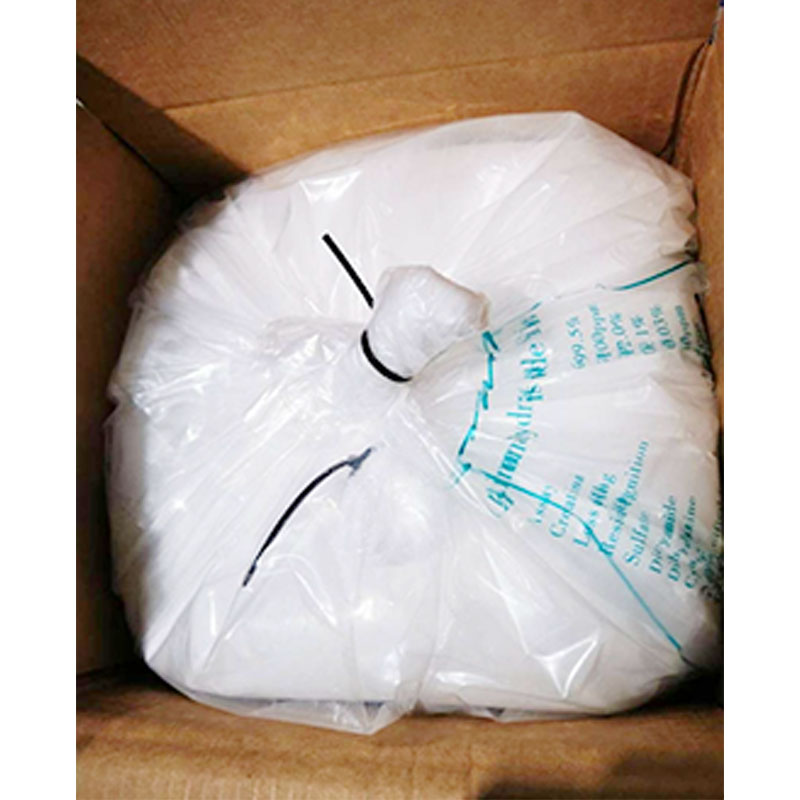Compared with creatine anhydrous, what are the advantages of creatine monohydrate in terms of solubility?
Release Time : 2025-01-16
Creatine, as an endogenous amino acid derivative, plays a vital role in human energy metabolism, especially in muscles and brain. Creatine exists mainly in two forms: creatine monohydrate and creatine anhydrous. These two forms have significant differences in chemical structure, physical properties and bioavailability, especially in solubility.
First of all, from the chemical structure point of view, creatine monohydrate is a compound formed by the combination of creatine molecules and water molecules. This structure makes creatine monohydrate more hydrophilic when dissolved. In contrast, creatine anhydrous is a pure creatine form without water, and its solubility is affected to a certain extent by its more hydrophobic chemical properties. Therefore, under the same conditions, creatine monohydrate is generally more soluble in water and dissolves faster.
The advantage in solubility makes creatine monohydrate more convenient in preparation and use. For example, when preparing creatine solution, creatine monohydrate can be quickly and completely dissolved in water to form a uniform and transparent solution. This not only improves the efficiency of solution preparation, but also helps ensure the effective absorption and utilization of creatine in the body. In contrast, anhydrous creatine may require longer time and higher temperature when dissolving, and may even in some cases be incompletely dissolved or form precipitation, thus affecting its bioavailability and use effect.
In addition, the advantages of creatine monohydrate in solubility are also reflected in its stability and preservation. Because the creatine monohydrate molecule contains crystal water, it can maintain a certain stability in a dry environment and is not prone to deliquesce or deterioration. At the same time, during storage, creatine monohydrate can also better maintain its chemical properties and biological activity, thereby extending its shelf life and service life. In contrast, anhydrous creatine may be more susceptible to deliquesce or agglomeration due to the influence of environmental humidity during storage, which in turn affects its solubility and use effect.
In addition to its solubility advantages, creatine monohydrate also has other advantages. For example, creatine monohydrate is generally more easily absorbed and utilized by the human body than anhydrous creatine. This is because the water molecules in creatine monohydrate help dissolve creatine, making it easier for it to enter the blood and muscle cells. In addition, creatine monohydrate is relatively low in production cost, which makes it more cost-effective and competitive in the market.
However, it is worth noting that although creatine monohydrate has advantages in solubility, it is not the best choice in all cases. In some specific application scenarios, anhydrous creatine may be more suitable for use. For example, in anhydrous environment or when a high concentration of creatine solution is required, anhydrous creatine may be more advantageous. Therefore, when choosing a form of creatine, it is necessary to make comprehensive considerations based on specific application scenarios and needs.
In summary, creatine monohydrate has significant advantages over anhydrous creatine in solubility. This advantage makes creatine monohydrate more convenient and efficient in preparation and use, and also helps to ensure its bioavailability and use effect.
First of all, from the chemical structure point of view, creatine monohydrate is a compound formed by the combination of creatine molecules and water molecules. This structure makes creatine monohydrate more hydrophilic when dissolved. In contrast, creatine anhydrous is a pure creatine form without water, and its solubility is affected to a certain extent by its more hydrophobic chemical properties. Therefore, under the same conditions, creatine monohydrate is generally more soluble in water and dissolves faster.
The advantage in solubility makes creatine monohydrate more convenient in preparation and use. For example, when preparing creatine solution, creatine monohydrate can be quickly and completely dissolved in water to form a uniform and transparent solution. This not only improves the efficiency of solution preparation, but also helps ensure the effective absorption and utilization of creatine in the body. In contrast, anhydrous creatine may require longer time and higher temperature when dissolving, and may even in some cases be incompletely dissolved or form precipitation, thus affecting its bioavailability and use effect.
In addition, the advantages of creatine monohydrate in solubility are also reflected in its stability and preservation. Because the creatine monohydrate molecule contains crystal water, it can maintain a certain stability in a dry environment and is not prone to deliquesce or deterioration. At the same time, during storage, creatine monohydrate can also better maintain its chemical properties and biological activity, thereby extending its shelf life and service life. In contrast, anhydrous creatine may be more susceptible to deliquesce or agglomeration due to the influence of environmental humidity during storage, which in turn affects its solubility and use effect.
In addition to its solubility advantages, creatine monohydrate also has other advantages. For example, creatine monohydrate is generally more easily absorbed and utilized by the human body than anhydrous creatine. This is because the water molecules in creatine monohydrate help dissolve creatine, making it easier for it to enter the blood and muscle cells. In addition, creatine monohydrate is relatively low in production cost, which makes it more cost-effective and competitive in the market.
However, it is worth noting that although creatine monohydrate has advantages in solubility, it is not the best choice in all cases. In some specific application scenarios, anhydrous creatine may be more suitable for use. For example, in anhydrous environment or when a high concentration of creatine solution is required, anhydrous creatine may be more advantageous. Therefore, when choosing a form of creatine, it is necessary to make comprehensive considerations based on specific application scenarios and needs.
In summary, creatine monohydrate has significant advantages over anhydrous creatine in solubility. This advantage makes creatine monohydrate more convenient and efficient in preparation and use, and also helps to ensure its bioavailability and use effect.





